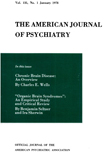PROGNOSTIC VALUE OF PERCEPTUAL DISTORTION OF TEMPORAL ORIENTATION IN CHRONIC SCHIZOPHRENICS
Abstract
The data obtained by systematic investigation have proven the clinical observation of perceptual distortion of temporal orientation in regressed schizophrenics. The fact that the mean stated age was approximately equal to the mean age on admission plus 7 months suggests that it took, on the average, a relatively short time after admission for the temporal orientation to become arrested. It also suggests that apparently hospitalization took place rather late in the course of the disease despite the relative youth of the patients. With increasing age the distortion becomes more conspicuous. These observations dramatically illustrate the known clinical fact of the importance of early treatment before permanent distortion sets in. Since we have not found this phenomenon in other than clinically dull, apathetic, and regressed schizophrenics we are led to interpret its presence as indicative of poor prognosis, and of differential diagnostic value. This preliminary investigation lends credence to Mettler's contention(2).
There is reason to believe that prognosis based on the presence or absence of perceptual disorder would be more reliable and indicate results earlier than prognosis that relies mainly on evidence of presence or absence of affect. The psychiatric patient, like any other, is to be studied as a whole personality possessed of structure and organic function as well as psychodynamic mechanisms.
It is noteworthy, that even in those chronic regressed schizophrenics, whose behavior and hospital adjustment improved following ECT and/or Thorazine medication, the perceptual distortion of temporal orientation remained unaffected.
Access content
To read the fulltext, please use one of the options below to sign in or purchase access.- Personal login
- Institutional Login
- Sign in via OpenAthens
- Register for access
-
Please login/register if you wish to pair your device and check access availability.
Not a subscriber?
PsychiatryOnline subscription options offer access to the DSM-5 library, books, journals, CME, and patient resources. This all-in-one virtual library provides psychiatrists and mental health professionals with key resources for diagnosis, treatment, research, and professional development.
Need more help? PsychiatryOnline Customer Service may be reached by emailing [email protected] or by calling 800-368-5777 (in the U.S.) or 703-907-7322 (outside the U.S.).



